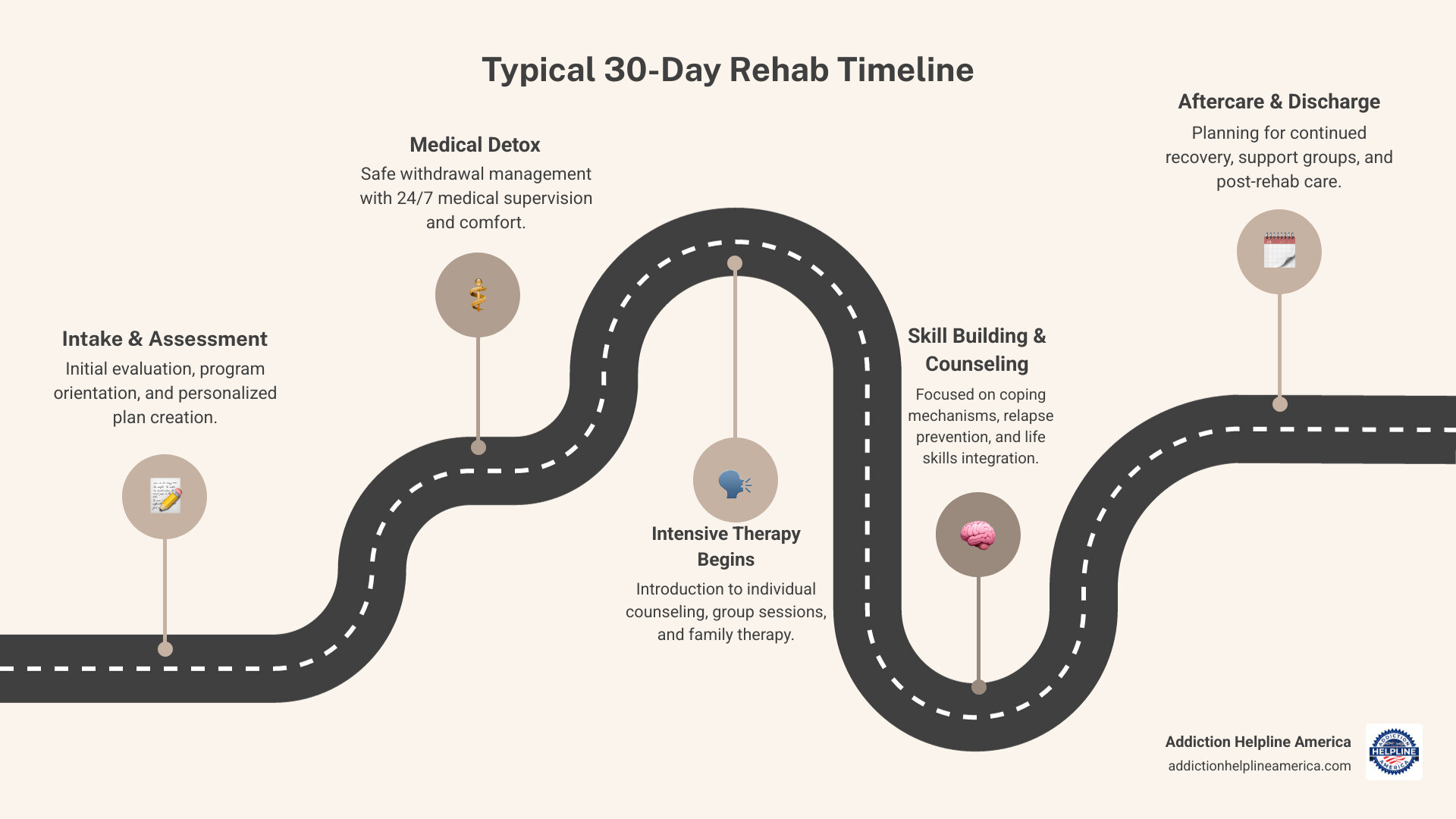
Understanding 30 Days Rehab: A Manageable Path to Recovery
30 days rehab is a short-term addiction treatment program designed to help individuals safely detox, begin therapy, and establish foundational recovery skills in a structured, supportive environment.
Quick Overview: What 30-Day Rehab Offers
- Duration: 28-30 days of intensive treatment
- Setting: Usually residential/inpatient with 24/7 medical support
- Core Components: Medical detox, individual and group therapy, family sessions, and relapse prevention planning
- Best For: Individuals with mild to moderate addiction, first-time treatment seekers, or those needing a structured reset
- Average Cost: $5,000-$20,000 (often covered by insurance)
- Key Benefit: A manageable commitment that provides a strong foundation for recovery
When struggling with addiction, long-term treatment can feel overwhelming. A 30-day program offers an achievable starting point. It provides crucial time to detox safely, stabilize physically, and learn essential coping techniques in a trigger-free environment. While the National Institute on Drug Abuse notes that longer stays can improve outcomes, a one-month program is a powerful jumpstart.
Think of it as the beginning of recovery, not the end. The structured routine helps your brain and body heal while professionals guide you through the difficult early days. Most insurance plans readily cover 30-day programs, making them financially accessible. However, success rates dramatically improve when this initial treatment is followed by continuing care, such as support groups or ongoing counseling.
At Addiction Helpline America, we help individuals and families steer the process of choosing and accessing addiction treatment. Our team connects you with evidence-based 30 days rehab programs nationwide, providing confidential support every step of the way.
30 days rehab terms you need:
What to Expect from a 30-Day Rehab Program
When you enter a 30 days rehab program, you step into a carefully designed environment focused on your recovery. Most programs are residential, meaning you live at the facility, fully immersed in a structured setting free from outside distractions and triggers. This allows you to pause your regular life and concentrate entirely on getting well.
Residential treatment provides constant support, including 24/7 medical supervision, which is critical during detox. Therapeutic support is woven into your entire day, and you are surrounded by professionals and peers who understand the battle against addiction. This stable, caring environment replaces the chaos that often fuels substance use.
A Typical Day and Treatment Components
Days in a 30 days rehab program follow a structured schedule to create safety and purpose. Mornings often start with wellness activities like yoga or meditation to teach new coping skills. After a healthy breakfast, the day’s core therapeutic work begins.
Treatment components typically include:
- Group Therapy: The backbone of treatment, where you connect with peers, share experiences, and build communication skills in a supportive setting.
- Individual Counseling: Private sessions with a therapist to explore the root causes of your addiction, identify triggers, and develop personalized coping strategies.
- Family Therapy: Sessions designed to repair damaged relationships, educate loved ones on how to support recovery, and rebuild trust.
- Educational Workshops: Classes on topics like life skills, stress management, and relapse prevention. Some programs also discuss What is Medication Assisted Treatment?, which combines therapy with medication.
Healthy meals are provided to help your body heal, and evenings may include recreational activities or peer support meetings.
The Core Therapies Used
Effective 30 days rehab programs use evidence-based practices that are proven to work. Key therapies include:
- Cognitive-Behavioral Therapy (CBT): Helps you identify and change the negative thought patterns and behaviors that lead to substance use. CBT provides practical skills for managing triggers and cravings.
- Motivational Interviewing: A collaborative approach where therapists help you find your own motivation to change, strengthening your commitment to sobriety.
- Dual Diagnosis Treatment: Roughly 50% of people with substance use disorders also have a co-occurring mental health condition like depression or anxiety. Quality programs offer integrated treatment to address both issues simultaneously, which is critical for long-term success. For more information, see our Mental Health Helpline Text Guide and resources from the National Institute of Mental Health.
The best programs tailor these and other therapies, like trauma-informed care, to your specific needs.
The Role of Medical Detox
For many, medical detox is the critical first step in a 30 days rehab program. Before therapy can be effective, your body must be free from substances. Withdrawal can be uncomfortable and even dangerous for substances like alcohol and benzodiazepines, making medical supervision essential.
During medical detox, which typically lasts 3-7 days, you receive 24/7 medical monitoring to manage withdrawal symptoms safely and comfortably. Healthcare professionals track vital signs and may administer medications to ease discomfort. As SAMHSA recommends, this supervision is crucial for preventing serious complications.
Detox is not a cure; it is stabilization. It clears your mind and body so you can fully engage in the therapeutic work of recovery. Learn more in our Ultimate Detox Facility Near Me Guide. Once detox is complete, you are ready for the real work of building a sober life.
Is a 30-Day Rehab Program Right for You?
Choosing addiction treatment is a deeply personal decision. A 30 days rehab program is a powerful starting point for many, but its suitability depends on the severity of your addiction, your personal circumstances, and your recovery history. Being honest about your needs is key to finding the right level of support for lasting recovery.
Benefits of a 30-Day Program
Many people choose a 30 days rehab program for several key reasons:
- Manageable Commitment: Thirty days feels more achievable than a multi-month stay, making it easier to take the first step.
- Lower Upfront Cost: Shorter programs are generally less expensive than long-term options.
- Higher Likelihood of Insurance Coverage: Insurance providers are often more likely to approve a 30-day stay, reducing out-of-pocket costs.
- Effective Jumpstart: It provides an intensive, focused period to detox safely, learn essential coping skills, and build a foundation for recovery.
- Safe Environment: A residential program removes you from daily triggers and stressors, allowing you to focus completely on healing.
- Physical Stabilization: It offers dedicated time for your body to heal and adjust to functioning without substances under medical supervision.
Limitations and Comparison to Longer Programs
While powerful, a 30 days rehab program has limitations. It is not a cure. Addiction is a chronic disease, and 30 days is the beginning of a lifelong journey. For those with severe, long-term addiction or co-occurring mental health disorders, it may not be enough time to address complex underlying issues.
Research from the National Institute on Drug Abuse shows that longer treatment durations, particularly 90 days, often lead to better long-term outcomes. A longer stay allows more time to practice sober living skills and build a robust support network.
Here’s how different program lengths compare:
| Feature | 30-Day Rehab | 60-Day Rehab | 90-Day Rehab |
|---|---|---|---|
| Duration | ~1 month | ~2 months | ~3 months |
| Intensity | High, focused on immediate stabilization | High, deeper exploration of root causes | Very high, comprehensive integration and skill mastery |
| Focus | Detox, initial coping skills, relapse prevention | Behavioral change, emotional healing, support system | Lifestyle changes, trigger identification, aftercare plan |
| Ideal Candidate | Mild/moderate addiction, first-timers, time/financial constraints, reset after relapse | Moderate addiction, co-occurring disorders, deeper therapeutic work | Severe addiction, chronic relapse, comprehensive life restructuring |
Who is a good candidate for 30 days rehab?
A 30 days rehab program is often a great fit for:
- Individuals with mild to moderate substance use disorder, where a month of intensive treatment can halt the addiction’s progression.
- First-time treatment seekers who may find a shorter program less intimidating and a good introduction to structured care.
- People with demanding careers or family duties who cannot manage a longer absence from their responsibilities.
- Those who have relapsed and need a structured reset to reinforce coping skills and get back on solid ground.
The best way to know if a 30-day program is right for you is to speak with an addiction professional. At Addiction Helpline America, we can help assess your situation and guide you to the level of care that offers the best chance for success.
Navigating the Logistics of 30 Days Rehab
Once you decide a 30 days rehab program is the right fit, the next step is handling the logistics: finding a quality program, understanding the cost, and preparing for your stay. This can feel overwhelming, but you don’t have to do it alone.
How to Choose the Right Program
Choosing the right 30 days rehab program is crucial for your recovery. Research shows that personalized addiction care leads to better outcomes, so finding a program that fits your specific needs is essential. For a detailed guide, see our resource on Choosing the Right Rehab Facility.
Look for these key features:
- Accreditation and Licensing: Ensures the facility meets established standards for quality and safety.
- Qualified Staff: The team should include licensed therapists, addiction specialists, and medical doctors.
- Evidence-Based Methodologies: The program should use proven therapies like Cognitive Behavioral Therapy (CBT) and Motivational Interviewing.
- Dual Diagnosis Treatment: If you struggle with mental health challenges, the program must offer integrated treatment for both addiction and mental health.
- Aftercare Planning: A quality program begins planning for your transition back to daily life from day one.
- Specialized Tracks: Some facilities offer programs for specific groups like veterans or LGBTQ+ individuals, which can provide more targeted support.
At Addiction Helpline America, we can help you evaluate these factors and match you with a program that fits your needs.
Cost and Insurance Coverage
The cost of a 30 days rehab program typically ranges from $5,000 to $20,000, with luxury facilities costing more. The price depends on location, amenities, and the level of care.
Fortunately, the Affordable Care Act (ACA) requires most insurance plans to cover addiction treatment as an essential health benefit. Insurance providers are often more likely to approve a 30-day program than a longer stay, making it a financially accessible option for many.
Every insurance plan is different, so verify your benefits before committing. You can call your provider or let the rehab facility’s admissions coordinator help—they are experts at navigating insurance. Addiction is a recognized medical condition, and in some cases, it may be considered a disability, as explained in our article Drug Addiction A Disability.
Don’t let cost be a barrier. Payment plans, sliding-scale fees, and scholarships are often available. The cost of treatment is an investment in your future, while the cost of untreated addiction is far greater.
Life After a 30-Day Program: Success and Continuing Care
Completing a 30 days rehab program is a monumental first step. You’ve built a strong foundation, but recovery is a lifelong journey. The real work of building a sober life begins after you leave the structured environment of treatment. This is where continuing care, or aftercare, becomes essential for long-term success.
What is the success rate of 30 days rehab?
Success in recovery is more than just a percentage; it’s about improved health, relationships, and overall well-being. Relapse rates for addiction (40-60%) are similar to other chronic diseases like asthma or hypertension, which highlights that addiction is a manageable condition, not a moral failing.
Research on treatment effectiveness shows that several factors strongly predict long-term sobriety after a 30 days rehab program:
- Individual motivation and commitment to recovery.
- A strong support system of family, friends, and peers.
- Aftercare compliance and sticking to a continuing care plan.
- Addressing co-occurring disorders like depression or anxiety.
A 30-day program is an effective jumpstart, but what you do afterward is what sustains recovery.
The Critical Role of Aftercare
The transition from rehab back to daily life is a vulnerable period. An aftercare plan bridges this gap, providing continued support as you steer real-world stresses and triggers. A Journal of Alcohol Research study on continuing care confirms that ongoing support after rehab significantly improves success rates.
Effective aftercare plans, which should be developed during your rehab stay, often include:
- Step-Down Levels of Care: Gradually transitioning to more independence while maintaining structured support.
- Sober Living Homes: A drug- and alcohol-free environment with peer support and accountability.
- Ongoing Therapy: Individual or group counseling to continue processing challenges and refining coping skills.
- Support Groups: Peer-led groups like Narcotics Anonymous provide invaluable shared experience and community.
Building a fulfilling sober life is a process. Our Help A Drug Addict Support Recovery Guide offers more resources for this crucial phase. Addiction Helpline America can help you create a personalized aftercare plan that fits your life and supports your long-term goals.
Frequently Asked Questions about 30-Day Rehab
When considering a 30 days rehab program, it’s natural to have questions. Here are straightforward answers to some of the most common concerns.
Is 30 days long enough to get sober?
A 30 days rehab program is an excellent start, providing a strong foundation for recovery. It is enough time to detox safely, stabilize, and learn initial coping skills. However, addiction is a chronic disease requiring ongoing management. Research suggests that longer treatment durations (e.g., 90 days) often yield better long-term outcomes. The key is to view a 30-day program as the beginning of your journey and to commit to a comprehensive aftercare plan.
Can I lose my job for going to rehab?
In most cases, your job is protected by law. Two key federal laws offer protection:
- The Family and Medical Leave Act (FMLA) allows eligible employees to take up to 12 weeks of unpaid, job-protected leave for serious health conditions, including addiction treatment.
- The Americans with Disabilities Act (ADA) prohibits employers from discriminating against individuals with a history of addiction who are in a supervised recovery program.
Your medical information is confidential. Many employers are supportive of employees seeking help. If you have concerns, consider a confidential conversation with your HR department.
What should I pack for a 30-day stay?
Facilities have specific rules to create a safe, focused environment. Always call the admissions team for their exact list, but general guidelines include:
- What to Bring: Comfortable, modest clothing for about a week (laundry is available), alcohol-free toiletries, a journal and pen, a list of important contacts, your ID and insurance card, and any prescription medications in their original, labeled bottles.
- What to Leave at Home: Prohibited items typically include drugs and alcohol, weapons, non-prescribed medications, products containing alcohol (like mouthwash), revealing clothing, and most electronics. Policies on cell phones and laptops vary, so be sure to ask.
Arriving with the right items helps you settle in quickly and focus on your recovery.
Take the First Step Toward a New Life
Seeking information about recovery takes courage. A 30 days rehab program is a powerful and accessible way to start your journey. It offers a chance to pause the chaos of addiction, heal in a supportive environment, and build the essential skills for a sober future.
While 30 days is a manageable start, lasting recovery depends on your personal commitment, the quality of care you receive, and a strong aftercare plan. Finding a program that fits your unique needs is the most important factor for success.
We know this step can feel overwhelming, but you don’t have to do it alone. At Addiction Helpline America, we provide free, confidential, and personalized guidance. Our team will listen to your story and connect you with the right 30 days rehab program from our nationwide network of trusted treatment centers. We can help with insurance verification, finding specialized care, and answering all your questions.
Don’t let fear hold you back. A healthier, sober life is possible, and it starts with one call or click.
Our helpline is 100%
free & confidential
If you or someone you care about is struggling with drug or alcohol addiction, we can help you explore your recovery options. Don’t face this challenge alone—seek support from us.
Programs
Resources
Will my insurance
cover addiction
treatment?
We're ready to help
Find the best
drug or alcohol treatment
center
Are you or a loved one struggling with addiction? Call today to speak to a treatment expert.

















